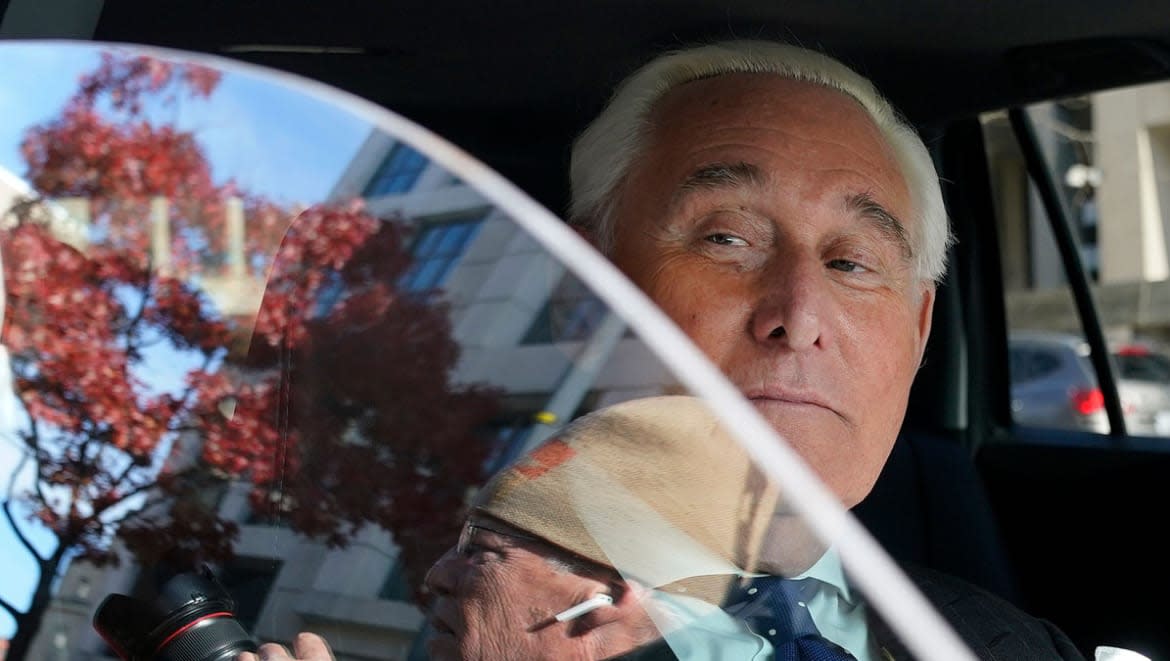Here‘s Why Trump Commuted Stone’s Sentence Instead of Pardoning Him

Roger Stone famously has a tattoo of Richard Nixon on his back. He may be considering adding one depicting Donald Trump.
That’s because President Trump commuted Stone’s prison sentence on Friday night, relieving the political operative of 40 months behind bars.
In November, Stone was convicted by a jury of seven counts of lying to Congress, obstructing a congressional investigation, and tampering with a witness by threatening to kill him and, for good measure, his dog.
The focus of Stone’s crimes was his work during the 2016 presidential election “to obtain information from an organization called WikiLeaks that would help the Trump campaign and would harm the campaign of Trump’s opponent, Hillary Clinton,” according to the initial sentencing memorandum filed by the government.
Special Counsel Robert Mueller concluded that WikiLeaks published email messages that had been stolen by Russian intelligence from the Democratic Party and the Clinton campaign as part of Russia’s attack on the election.
Clemency for Stone is the latest effort by the Trump Administration to reverse the work of the Special Counsel. Trump’s Department of Justice has already moved to dismiss charges against Russian entities involved in the election attack and former national security adviser Michael Flynn. Now, with Stone facing his date to report to prison on Tuesday, Trump has pulled the rug out from under Mueller and made a mockery of the rule of law once again.
‘I Will Piss on Your Grave’: Emails Reveal Roger Stone’s Abuse of Frenemy Randy Credico
The commutation is also part of Trump’s ongoing attempt to rewrite history. Whereas Mueller found that Russia interfered with the 2016 election in “sweeping and systematic fashion,” the White House press release announcing Stone’s clemency told a different story.
It stated that Stone was a “victim of the Russia Hoax that the Left and its allies in the media perpetuated for years in an attempt to undermine the Trump Presidency.”
Trump’s action is not just a distasteful use of the pardon power, it smacks of corruption because it is designed to benefit himself.
Stone has publicly stated that he resisted pressure to provide incriminating information about Trump to prosecutors, in a message that practically begged for clemency. “He knows I was under enormous pressure to turn on him,” Stone stated. “It would have eased my situation considerably. But I didn’t.”
In commuting Stone’s sentence, Trump is not rewarding a loyal friend, he is protecting himself. It is always about himself. Trump’s action sends the message that if you keep your silence about Trump, you will be taken care of.
The brand of clemency Trump used here is a bit of a tell. Rather than pardoning Stone, Trump ordered a commutation, which means that Stone’s conviction remains on his record, but he does not have to serve a day in prison. One reason to use a commutation instead of a pardon is to preserve the illusion of Stone’s innocence.
A pardon typically requires an expression of guilt and remorse, and conveys forgiveness and mercy. With a commutation, Stone may persist in his claims of innocence by challenging his conviction in a motion for new trial and on appeal. Commutation perpetuates the “witch hunt” narrative of Trump’s revisionist history.
A second, and more important, reason for commutation, though, is that it preserves Stone’s Fifth Amendment right against self-incrimination. This factor makes commutation a much more attractive alternative for Trump.
In mob cases, a common prosecution tactic is to subpoena convicted underlings to testify about higher-ups before the grand jury. Once defendants are convicted and have exhausted their appeals, they no longer have any criminal exposure, and so they have no right against self-incrimination to avoid testifying. Under oath, the offender must either tell the truth or face perjury charges.
In this instance, one could imagine that prosecutors who still retain a shred of independence, such as acting U.S. Attorney Audrey Strauss in the Southern District of New York, might want to call Stone before the grand jury to ask him what he knows about Trump’s conduct.
By granting commutation instead of a pardon, Trump has crafted a scenario in which Stone gets relief from prison, but may still invoke his Fifth Amendment right against self-incrimination to avoid testifying about the president. If only those White House lawyers were using their powers for good instead of evil.
Stone has been rewarded for his loyalty, but it is Trump who has reaped the greatest prize. Not only may Stone be getting Trump tattooed on his back, but maybe Trump should consider getting Stone tattooed on his.
Get our top stories in your inbox every day. Sign up now!
Daily Beast Membership: Beast Inside goes deeper on the stories that matter to you. Learn more.

 Yahoo News
Yahoo News 
